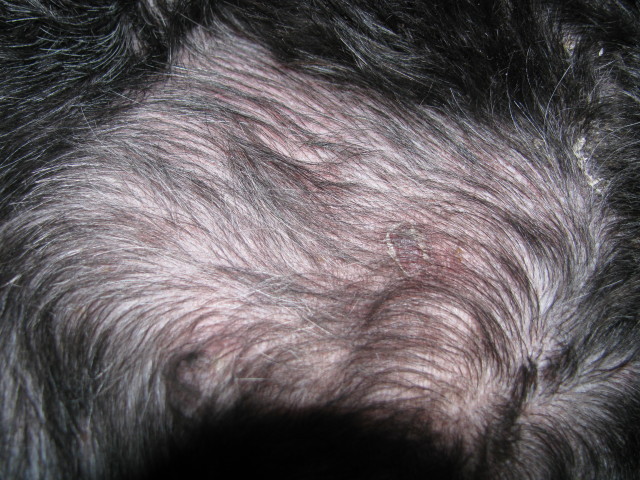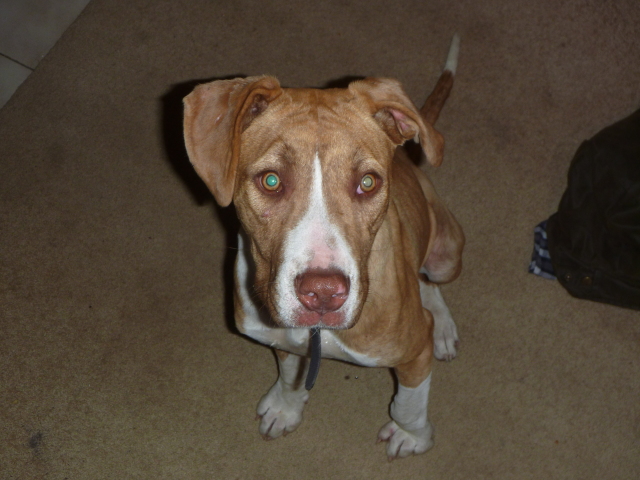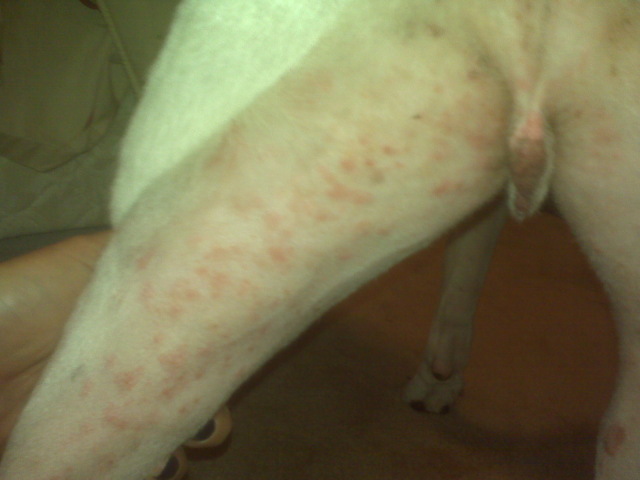QuestionHi Kristen!
I think I've written to you before about my Pembroke Welsh Corgi's diet, because he is overweight (about 38 lbs.-supposed to be 30 lbs.). I needed to know how much commercial food to feed him. Well, I have decided that I would like to feed him homemade food, but I've looked around the net, and can't find the type of recipe I'm looking for. I certainly want to make sure I'm providing all the nutrients necessary, and I don't want to go into this without advice because I'm afraid of depriving him nutritionally. I would like a recipe that does NOT contain raw meat, although cooked meat is
ok. He loves almost all veggies and fruits, he really is NOT a picky eater, so I would prefer to feed him a lot of vegs and fruits, if that's ok. I am willing to do a lot of prep work, but I would prefer to be able to make a big batch and store it in the freezer or sealed jars if at all possible, to cut down on the work. I am also concerned with the cost of it all, as I don't have a lot of extra money. A friend had to buy vitamin supplements for her dog, and they were very expensive. If possible, I would like a food that meets all of his nutritional needs without buying extra vitamins. Another concern I have is that mushy homemade foods would seem harmful to his teeth in the long run.
In a nutshell, important factors are:
Weight loss
lots of fruits and veggies
nutritionally complete
ok for teeth
economical
NO raw meat
Daunting question, huh? I understand that I will not necessarily get all I'm asking for (I may have to pay a bit extra, for example), but I'm hoping you can help somewhat!
Info about my dog Tanner:
male Pembroke Welsh Corgi, 3 years old, very active playing with my kids around the house, no health probs other than weight, HUGE appetite!Mostly indoor dog, very happy dog.
Thank you so much for any help you can provide!
AnswerHello again, Ericka!
Sorry for taking so long to get back to you. I just wanted to make sure I gave you accurate advice.
Putting your dog on a homemade diet can either be the best or the worst thing you could do for him. When prepared correctly, homemade diets are much better for your dog than commercial kibble. Incorrectly done, however, can result in disaster in the form of health problems and vet bills. And you can certainly make up say, a week's worth of food at one time and freeze it!
You say you want the food to contain mostly fruits and veggies, but that simply would not be nutritious for your dog. Dogs are carnivores, though many people claim they are omnivores. If you look at the teeth of a dog, there are absolutely no indications that the dog is an omnivore. Its teeth and jaw structure are designed for eating meat. If you take a look at the digestive tract, it also confirms that dogs are not omnivores. Dogs have very short digestive tracts, again, designed for breaking down meats quickly, to reduce the chances that the dog would contract any disease from the bacteria that might be present in the meat. The less time a bacteria spends in the digestive tract, the less time it has to infect the dog with a disease. That's why animals like wolves and big cats have very short digestive tracts. Omnivores, on the other hand, have longer digestive tracts, because fruits, veggies, grains, etc. need longer to digest. They actually have to ferment in the intestines for the body to leach all the nutrients out of them.
If you feed a dog vegetables, they must be blended to a pulp before the dog can even begin to digest them. A dog's body is not designed to break down the cellulose in veggies, so you must do it for them in the blender. You may blend them raw or steam them first, but if you steam them, make sure they are cooled to room temperature before you feed them. Fruits should only be given as a treat or snack, and not included as part of the dog's daily meals when you are figuring how much to feed.
http://www.rawdogranch.com/veggies.htm explains how to prepare "veggie mush" if you absolutely must feed your dog veggies.
I don't normally recommend cooking meat that you are going to feed to your dog, because cooking gets rid of many of the vitamins, minerals, and amino acids that your dog needs. However, some people are just not comfortable feeding their dog raw meat, so if you absolutely have to cook what you feed your dog, I recommend not cooking it until it is completely done, but just searing the meat. Essentially you'll be serving it rare to the dog. You can feed any meat you choose, and meat should make up the bulk of the dog's food. Veggies should only make up 5%-10% of his diet per day. You will also need to give him a multivitamin daily since you will be getting rid of most of the vitamins and minerals by cooking the meat. If you were to feed raw, a multivitamin would not be necessary as long as you had the correct ratios of bone, meat, and veggies (if you chose to feed veggies). A multivitamin should not be very expensive. I did an online search for dog multivitamins and found a bottle of 250 tablets for $20. That would last you between 4 and 5 months (feeding him two tablets per day) and end up costing you only $0.16 per day for the multivitamins. Ask your vet if giving your dog half of a human multivitamin per day would be ok. Something else you will need to give him is an essential fatty acid 'supplement.' A good source of EFA's is fish oil. You can use human supplements for this. I get mine in the big bottles from K-mart. Give him one softgel per day (if he won't eat the whole softgel, you can prick the end with a toothpick and squeeze it onto his food, but that can get messy if you aren't careful). In addition to the fish oil, you will need to give him vitamin E so that his body can actually absorb and use the EFA's. Again, a bottle of human supplement is fine. Safflower oil is another good source of EFA's if you don't want to use fish oil, but it is rather expensive and must be kept refrigerated or it will go rancid. You absolutely MUST give vitamin E when you give fish oil or safflower oil.
HOW MUCH TO FEED?
To start with, feed him about 2% of his body weight, or in this case, 30 pounds if that's what you want him to get down to. That means that each day, he should be eating approximately 0.6 pound of food per day. Get an inexpensive scale so you do not over or underfeed him. Weigh everything together - after it has been cooked and pureed. Since you are wanting him to lose weight, start out with 10% of his meals as veggie mush. This means that for each meal, for a few weeks, he should be eating about 1/2 pound of meat and roughly 1/10 pound of veggie mush. What I would do, if you are preparing a week's worth of food, is cook between 4 and 5 pounds of meat (chicken, beef, pork, turkey, venison, rabbit, etc. cut into small, bite sized pieces - or you can use ground beef or turkey as well), drain all the grease off of it, let it cool to room temperature, and then portion it out into 7 Ziplock freezer bags or Gladware containers for the week. Place the bag or container on the scale and zero it before you add food to it, or your weight will be off. Then add 1/2 pound of meat to each bag or container, and pour the veggie mush in until it weighs 0.6 pound.
I don't know how many of each veggie you will need to start with, because I don't feed veggies at all, but as you get more familiar with preparing the meals, you will learn how many to use. At first, you may end up with too much or too little. If you end up with too much, pour it into a container and freeze it by itself until you make up another batch of meals, and then take it out, let it thaw to room temperature, and use it for that batch of meals. Remember not to use quite as many veggies the next time.
Lastly, you are concerned with his teeth on a homemade diet. If you cannot have his teeth cleaned once a year by your vet, and/or cannot brush his teeth at LEAST once a week at home, then I recommend giving him a few recreational raw bones every so often. A 'recreational' bone is one that is too big for the dog to actually eat, such as a legbone of a cow, horse, pig, deer, or goat. It should be raw because if it is cooked, it could splinter and he may swallow shards of bone that could become lodged and cause a blockage, or even rupture his digestive tract. Raw bones are much safer because they are softer and are not as apt to splinter. If you have a local butcher shop, that would be the best place to ask for one of these bones, and often you don't even have to pay for them if you tell the butcher it's for your dog. For a corgi, I wouldn't recommend a large bone like a cow shank, but rather something smaller, like from a pig, deer, or goat. Sometimes you can even ask the person behind the meat counter at the supermarket if they have any bones in the back that you could have for your dog. You should give him raw bones in his crate, in a room with a linoleum or other easily scrubbable floor, or outside to keep him from making a mess on your carpet. Raw bones should be discarded after a day or two inside, or a few days outside.
If you cannot find raw bones, then I guess your only other option is to buy one of the great big smoked beef bones from the pet store. These are cooked, so I would recommend getting the big ones if you have to go this route, so he's not as likely to break off small shards of it and swallow them.
Here's a recap of what I've said:
1. Meat should make up 90%-95% of his diet, with veggies being only 5%-10%. To start with, feed him 2% of his desired body weight. You can adjust as necessary if he gains or loses too much weight.
2. Meat should be seared, but not cooked all the way through.
3. Veggies should be pureed in the blender before serving, and can either be raw or steamed before blending.
4. Fruits should be fed as treats or snacks only, not part of his daily meals.
5. He will need a multivitamin daily - again, ask your vet if you can give him half of a human multivitamin.
6. He will need an EFA supplement daily - either a fish oil softgel (from the human supplement section of Kmart, Walmart, etc.) or a tablespoon of Safflower oil. Safflower oil should be kept in the fridge.
7. He will also need a vitamin E supplement daily, so his body can absorb and utilize the EFAs.
8. For his teeth, you will either need to brush them weekly, have them cleaned yearly by the vet, and/or provide him with recreational chew bones at least once every two weeks.
Good luck and I hope I've been of some help to you!
Kristen

 Help with my best friend :)
Question
cash
Hello!
&
Help with my best friend :)
Question
cash
Hello!
&
 Dry Dog Foods
Question
Prince Duke & Princess
I have two B
Dry Dog Foods
Question
Prince Duke & Princess
I have two B
 Dog fur is flaking off, scabbing, itching like crazy
Question
zacks tummy
Hi,
We have a four-year-old cockap
Dog fur is flaking off, scabbing, itching like crazy
Question
zacks tummy
Hi,
We have a four-year-old cockap
 Malnurished Bull Mastif x Great Dane ;
Question
Sticks
Hi,
Ive recently, (the last 24 hours) b
Malnurished Bull Mastif x Great Dane ;
Question
Sticks
Hi,
Ive recently, (the last 24 hours) b
 Large dog with possible poison ivy
Question
Guero
My poor dog has led a rough life to date
Large dog with possible poison ivy
Question
Guero
My poor dog has led a rough life to date